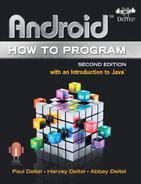Answers to Self-Review Exercises
a) public.
b) class.
c) new.
d) type, name.
e) default package.
f) instance variable.
g) float, double.
h) double-precision.
i) nextDouble.
j) modifier.
k) void.
l) nextLine.
m) java.lang.
n) import declaration.
o) floating-point number.
p) single-precision.
q) %f.
r) primitive, reference.
a) False. By convention, method names begin with a lowercase first letter and all subsequent words in the name begin with a capital first letter.
b) True.
c) True.
d) True.
e) False. A primitive-type variable cannot be used to invoke a method—a reference to an object is required to invoke the object’s methods.
f) False. Such variables are called local variables and can be used only in the method in which they’re declared.
g) True.
h) False. Primitive-type instance variables are initialized by default. Each local variable must explicitly be assigned a value.
i) True.
j) True.
k) True.
l) False. Such literals are of type double by default.
B.3 A local variable is declared in the body of a method and can be used only from the point at which it’s declared through the end of the method declaration. A field is declared in a class, but not in the body of any of the class’s methods. Also, fields are accessible to all methods of the class. (We’ll see an exception to this in Appendix F.)
B.4 A parameter represents additional information that a method requires to perform its task. Each parameter required by a method is specified in the method’s declaration. An argument is the actual value for a method parameter. When a method is called, the argument values are passed to the corresponding parameters of the method so that it can perform its task.
